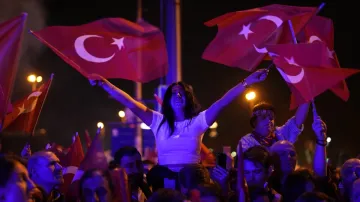Turkish President Erdogan suffers shocking defeat by opposition in municipal elections
Few expected the opposition Republican People's Party (CHP) to win the elections after a bitter loss in last year's presidential and parliamentary elections. However, voters were left discontent with Erdogan's handling of the economy, with rising inflation and cost-of-living crisis.

Ankara: In a major upset for Turkish President Recep Tayyip Erdogan, Turkey's main opposition party retained control over key cities and made huge gains in Sunday's local elections. Incumbent Istanbul Mayor Ekrem Imamoglu of the Republican People's Party, or CHP, was leading by a wide margin in Turkey's largest city and economic hub.
Additionally, Mansur Yavas, the mayor of the capital, Ankara, retained his seat with a stunning 25-point difference over his challenger, the results indicated after 90 per cent of ballot boxes were counted. In total, the CHP won the municipalities of 36 of Turkey's 81 provinces, according to Anadolu Agency, making its way into the strongholds of Erdogan's party and dealing a major blow to his aspirations to retake control of urban areas.
The CHP gained 37 per cent of the votes nationwide, compared to 36 per cent for the president’s party (Justice and Development Party), marking the CHP’s greatest electoral victory since Erdogan came to power two decades ago. Erdogan acknowledged the electoral setback in a speech delivered from the balcony of the presidential palace, saying his party had suffered “a loss of altitude” across Turkey and said his party will analyse by engaging in "courageous" self-criticism.
Why the election results are important?
The vote was seen as a measure of Erdogan's popularity across Turkey as he sought to win back control of key urban areas he lost to the opposition in elections five years ago. The CHP’s victory in Ankara and Istanbul in 2019 had shattered Erdogan’s aura of invincibility. The defeat in Istanbul is likely to sting the 70-year-old president the most as it is where he was born and raised and where he began his political career.
On the other hand, the result came as a boost for the opposition, which was left divided and demoralized after a defeat to Erdogan and his ruling Islamic-oriented party, also known as AKP, in last year's presidential and parliamentary elections. A large crowd, meanwhile, gathered outside Ankara City Hall to celebrate Yavas’ victory. “Ankara is proud of you!” supporters chanted.
“The voters decided to establish a new political order in Turkey,” CHP leader Ozgur Ozel told a crowd of jubilant supporters. “Today, the voters decided to change the 22-year-old picture in Turkey and open the door to a new political climate in our country.”
The turnout in these municipal elections was around 76 per cent, according to the state-run Anadolu Agency, compared to 87 per cent last year. Some 61 million people, including more than a million first-time voters, were eligible to cast ballots for all metropolitan municipalities, town and district mayorships as well as neighbourhood administrations.
Voters unhappy with Erdogan's government
Experts argued that the unprecedented victory of the opposition CHP over Erdogan's ruling AKP shows the voters are unhappy with his government. “The CHP is no longer the opposition party in local government now ... (Erdogan) is clearly aware that throughout Turkiye voters sent a clear message, even in conservative cities. It's unbelievable, it's a huge deal. It's not just about local government, it's about voters saying they're not happy with the AK Party government," said Seda Demiralp, a political science professor at Isik University in Istanbul.
Sinan Ulgen, director of the Istanbul-based Edam think tank, said “the surprising outcome” was due to voters wanting to punish the ruling party over the "depth of an economic malaise". “There were cross-party shifts in the vote, which did not happen in the national elections because of stronger ideological attachments. This time around the economy prevailed over identity," Ulgen added.
A six-party opposition alliance that was led by CHP disintegrated after it failed to oust Erdogan in last year’s election, unable to capitalise on the economic crisis and the government’s initially poor response to last year’s devastating earthquake that killed more than 53,000 people. Following last year's discouraging defeat, some had expected the opposition to perform poorly in Sunday's election.
However, a change in leadership in the CHP – from the 75-year-old Kemal Kilicdaroglu to Ozel, 49 – appeared to have revitalised the party and paved the way for incumbent CHP mayors and other candidates to secure conclusive victories. A new religious-conservative party, the New Welfare Party, or YRP, appeared to have attracted votes from AKP supporters who have been disillusioned with the government’s handling of the economy.
Sunday's election came amid an ongoing cost-of-living crisis with voters facing annual inflation that rose to 67 per cent in February. Meanwhile, Erdogan has allowed borrowing costs to rise to 50 per cent in a bid to combat soaring prices. Commentators said that although the economic crisis left Erdogan's popularity largely unaffected in last year's national polls, AKP voters felt more inclined to express discontent when his name was not on the ballot paper.
(with inputs from AP)
ALSO READ | India's befitting reply to Pakistan and Turkey at UNSC: 'Country that speaks soaked in red...'